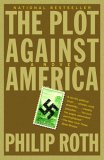Summary | Excerpt | Reading Guide | Reviews | Beyond the Book | Readalikes | Genres & Themes | Author Bio

Critics' Opinion:
Readers' Opinion:
First Published:
Oct 2004, 400 pages
Paperback:
Sep 2005, 400 pages
 Book Reviewed by:
Book Reviewed by:
BookBrowse Review Team
Buy This Book
Chapter 1
June 1940–October 1940
Vote for Lindbergh or Vote for War
Fear presides over these memories, a perpetual fear. Of
course no childhood is without its terrors, yet I wonder if I
would have been a less frightened boy if Lindbergh hadn't
been president or if I hadn't been the offspring of Jews.
When the first shock came in June of 1940—the nomination for
the presidency of Charles A. Lindbergh, America's international
aviation hero, by the Republican Convention at Philadelphia—my
father was thirty-nine, an insurance agent with a grade school education,
earning a little under fifty dollars a week, enough for the
basic bills to be paid on time but for little more. My mother—
who'd wanted to go to teachers' college but couldn't because of the
expense, who'd lived at home working as an office secretary after
finishing high school, who'd kept us from feeling poor during the
worst of the Depression by budgeting the earnings my father
turned over to her each Friday as efficiently as she ran the household
—was thirty-six. My brother, Sandy, a seventh-grader with a
prodigy's talent for drawing, was twelve, and I, a third-grader a
term ahead of himself—and an embryonic stamp collector inspired
like millions of kids by the country's foremost philatelist,
President Roosevelt—was seven.
We lived in the second-floor flat of a small two-and-a-half-family house on a
tree-lined street of frame wooden houses with redbrick
stoops, each stoop topped with a gable roof and fronted by a
tiny yard boxed in with a low-cut hedge. The Weequahic neighborhood
had been built on farm lots at the undeveloped southwest
edge of Newark just after World War One, some half dozen of the
streets named, imperially, for victorious naval commanders in the
Spanish-American War and the local movie house called, after
FDR's fifth cousin—and the country's twenty-sixth president—
the Roosevelt. Our street, Summit Avenue, sat at the crest of the
neighborhood hill, an elevation as high as any in a port city that
rarely rises a hundred feet above the level of the tidal salt marsh to
the city's north and east and the deep bay due east of the airport
that bends around the oil tanks of the Bayonne peninsula and
merges there with New York Bay to flow past the Statue of Liberty
and into the Atlantic. Looking west from our bedroom's rear window
we could sometimes see inland as far as the dark treeline of
the Watchungs, a low-lying mountain range fringed by great estates
and affluent, sparsely populated suburbs, the extreme edge
of the known world—and about eight miles from our house. A
block to the south was the working-class town of Hillside, whose
population was predominantly Gentile. The boundary with Hillside
marked the beginning of Union County, another New Jersey
entirely.
We were a happy family in 1940.My parents were outgoing, hospitable
people, their friends culled from among my father's associates
at the office and from the women who along with my mother
had helped to organize the Parent-Teacher Association at newly
built Chancellor Avenue School, where my brother and I were
pupils. All were Jews. The neighborhood men either were in business
for themselves—the owners of the local candy store, grocery
store, jewelry store, dress shop, furniture shop, service station, and
delicatessen, or the proprietors of tiny industrial job shops over by
the Newark-Irvington line, or self-employed plumbers, electricians,
housepainters, and boilermen—or were foot-soldier salesmen
like my father, out every day in the city streets and in people's
houses, peddling their wares on commission. The Jewish doctors
and lawyers and the successful merchants who owned big stores
downtown lived in one-family houses on streets branching off
the eastern slope of the Chancellor Avenue hill, closer to grassy,
wooded Weequahic Park, a landscaped three hundred acres whose
boating lake, golf course, and harness-racing track separated the
Weequahic section from the industrial plants and shipping terminals
lining Route 27 and the Pennsylvania Railroad viaduct east of
that and the burgeoning airport east of that and the very edge of
America east of that—the depots and docks of Newark Bay, where
they unloaded cargo from around the world. At the western end of
the neighborhood, the parkless end where we lived, there resided
an occasional schoolteacher or pharmacist but otherwise few professionals
were among our immediate neighbors and certainly
none of the prosperous entrepreneurial or manufacturing families.
The men worked fifty, sixty, even seventy or more hours a week;
the women worked all the time, with little assistance from laborsaving
devices, washing laundry, ironing shirts, mending socks,
turning collars, sewing on buttons, mothproofing woolens, polishing
furniture, sweeping and washing floors, washing windows,
cleaning sinks, tubs, toilets, and stoves, vacuuming rugs, nursing
the sick, shopping for food, cooking meals, feeding relatives, tidying
closets and drawers, overseeing paint jobs and household repairs,
arranging for religious observances, paying bills and keeping
the family's books while simultaneously attending to their
children's health, clothing, cleanliness, schooling, nutrition, conduct,
birthdays, discipline, and morale. A few women labored
alongside their husbands in the family-owned stores on the nearby
shopping streets, assisted after school and on Saturdays by their
older children, who delivered orders and tended stock and did the
cleaning up.
>From The Plot Against America by Philip Roth. Copyright by Philip Roth 2004. All rights reserved.





The Funeral Cryer by Wenyan Lu
Debut novelist Wenyan Lu brings us this witty yet profound story about one woman's midlife reawakening in contemporary rural China.
Your guide toexceptional books
BookBrowse seeks out and recommends the best in contemporary fiction and nonfiction—books that not only engage and entertain but also deepen our understanding of ourselves and the world around us.